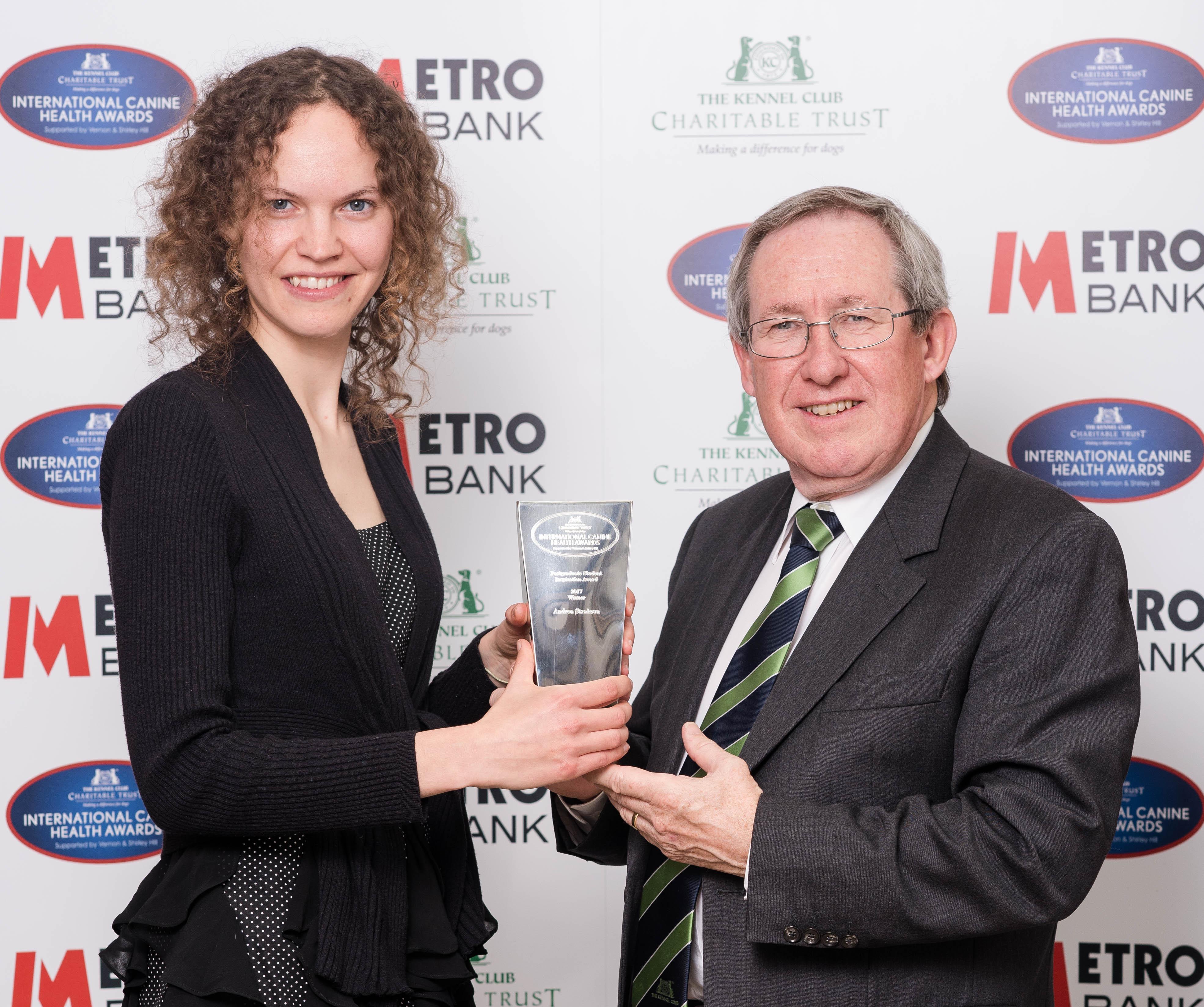
Submitted by Anna Davies on Wed, 31/05/2017 - 14:56
Andrea Strakova, 26, has won the Postgraduate Student Inspiration Award as part of one of the largest and most prestigious veterinary awards in the world, the International Canine Health Awards.
Andrea has been awarded a prize of £10,000 to help further her research into Canine Transmissible Venereal Tumour (CTVT), a contagious cancer that affects thousands of dogs all over the world.
Beginning as a tumour in one single dog that lived around 11,000 years ago, instead of dying with its host, CTVT took on a life of its own, spreading to other dogs during mating. It’s currently the oldest cancer known to scientists and affects around 1% of the global dog population.
The awards, which are run by the Kennel Club Charitable Trust and underwritten by a major gift from Vernon and Shirley Hill of Metro Bank, highlight those individuals who go one step further to promote the health and wellbeing of dogs through their work in the world of veterinary science.
This year’s awards were presented to winners by Professor Steve Dean, chairman of trustees of the Kennel Club Charitable Trust, on Wednesday 24th May at the Kennel Club in London, on behalf of the Vernon and Shirley Hill Foundation.
Andrea, who has been passionate about dogs from a young age, was first introduced to CTVT during her BA degree in Veterinary Science at Newnham College at the University of Cambridge. During her degree she conducted a research project where she contacted over 1,000 vets from 109 countries around the world to create the first global map of CTVT distribution and prevalence. She also tracked the disappearance of CTVT from the UK during the twentieth century, driven by introduction of rigorous dog control laws which limited the number of free-roaming dogs, a major reservoir for CTVT. Her undergraduate research, which was published in BMC Veterinary Research in 2014, found that CTVT affects around 1% of dogs around the world, across all inhabited continents.
Inspired by the work she completed during her undergraduate degree, Andrea wanted to further her research into CTVT so began a PhD in 2013 at King’s College at the University of Cambridge, which she is due to finish this summer. Her main goal has been to map the genetic and phenotypic diversity of the cancer around the world, and over time Andrea has collected and validated hundreds of CTVT samples from all over the world. She performed DNA sequencing to catalogue CTVT genetic diversity and from this was able to construct an evolutionary family tree that traces the global spread of CTVT.
Andrea, who was born in Prague and was raised near Reading in Berkshire, is planning to look into how CTVT evades the immune system, despite being a foreign graft, during her post-doctoral research. Her aim is to set up her own research group with a focus on CTVT genetics and immunology. The money from the International Canine Health Awards will not only contribute to the development of Andrea’s research career, but will also allow her to complete an important project on chemotherapy-resistance in CTVT tumours.
For the last year Andrea has worked with vets to collect samples of these tumours and using the money from the Postgraduate award, she will use the samples to compare the genetic and phenotypic characteristics of chemotherapy-resistant CTVT cases from different parts of the world to identify common features. CTVT is usually successfully treated with single-agent chemotherapy, but Andrea has come across chemotherapy-resistant CTVT tumours in different parts of the world, which if not researched more thoroughly, could become an enormous threat to dog health and render CTVT an incurable cancer.

CTVT provides an ideal platform to study cancer chemotherapy-resistance. Understanding the chemotherapy-resistance mechanisms in CTVT would have very important implications for the management and treatment of the cancer but additionally it could provide broader insights into chemotherapy-resistance in other canine and human cancers.
Speaking about winning the award, Andrea said: “It is a tremendous honour to receive the Postgraduate Student Inspiration Award and it is a real encouragement to continue my current research work, which I am very passionate about.
“I will complete my PhD in summer 2017 and I see the award as the first step towards my long-term passion and goal – continuing the crucial research into understanding a contagious cancer that affects thousands of dogs all over the world, and ultimately forging a career that combines exciting canine cancer research with the potential to improve canine health.
“Importantly, the award will allow me to complete a critical project on chemotherapy resistance in dogs together with providing an ideal and important opportunity to widen awareness about CTVT both within the veterinary community, and amongst the public.”
Professor Steve Dean, chairman of trustees of the Kennel Club Charitable Trust, which runs the International Canine Health Awards, said: “We are thrilled to give this award to Andrea for her research into Canine Transmissible Venereal Tumours (CTVT). Her dedication and commitment to her research is remarkable and her knowledge of the disease is quite unique and could significantly contribute towards improving the health of thousands of dogs. Her studies may also add to our knowledge of cancer in general. We want to congratulate Andrea on winning this award, and look forward to hearing more about her work into CTVT in the future.”
Vernon Hill, founder and chairman of Metro Bank, and Shirley Hill, whose foundation underwrites the awards commented: “Congratulations to Andrea on winning this award. Her research into the oldest known canine cancer is incredibly inspirational to the student veterinary community and we are expecting big things from her future research into such a distressing disease that affects so many dogs over the world.”
